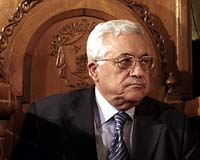| . |  |
. |
Pristina (AFP) Aug 13, 2009 New NATO chief Anders Fogh Rasmussen made his maiden visit to Kosovo on Thursday to evaluate his plans to trim the alliance's security mission in the breakaway Serbian province a decade after war. Rasmussen, a former prime minister of Denmark, hopes to gradually wind down the presence of NATO's 13,800-strong Kosovo Force (KFOR) to a small reaction unit or withdraw it completely. "I would like to stress that this decision only reflects the improvement of the security situation in Kosovo and... is conditionally based," he said in the capital Pristina. "That means that reductions will take place in accordance with the continued improvement in the security situation," Rasmussen. Just before leaving Kosovo, Rasmussen told reporters at the Pristina airport that the "first step (of reduction) is planned to take place by January next year. "Our intention is to reduce the number of troops to a level of around 10,000, he said. "The next step will be a reduction to around 5,700 troups, but very much will depend to developments in Kosovo and the region," Rasmussen added. After taking over from his predecessor Jaap de Hoop Scheffer this month, Rasmussen made his first official visit to Afghanistan, where he wants to boost NATO troops to complete a successful handover of security to local forces. At the time, he said one of the priorities of his four-year term was "to see KFOR reduced to just a small reaction force, or out altogether." Speaking to reporters here, he said: "The fact I decided to go to Kosovo only a few days after I took over my new office clearly reflects that I will give Kosovo high priority in my work as secretary general of NATO. "We will stay committed to ensuring the security in Kosovo and in parallel with that I can confirm that we will continue to assist the Kosovo authorities in the continued development of the Kosovo Security Force." Launched in January this year, the KSF is to eventually number 2,500 members in a civilian protection force meant to help in emergency situations. But the KSF's formation was met with anger by Belgrade's government and Serbs in Kosovo, who fear it will be dominated by ethnic Albanians they cannot trust. NATO however says that Kosovo's security has improved since it declared independence from Serbia in February 2008, a move backed by the West but opposed by Serbia, Russia and China. "We will definitely not take decisions that have a negative impact on security in Kosovo," Rasmussen stressed. In his one-day visit to Kosovo, the NATO chief met with President Fatmir Sejdiu, Prime Minister Hashim Thaci and KFOR commander Lieutenant General Giuseppe Emilio Gay. He then made his way to a KFOR command post near Mitrovica, the ethnically divided northern town that has witnessed some of the worst violence in Kosovo since its 1998-1999 war. Tens of thousands of NATO troops entered Kosovo after the alliance's 11-week bombing campaign in 1999 to end a brutal crackdown by forces loyal to late Serbian president Slobodan Milosevic on separatist ethnic Albanians. In June, the alliance revealed plans to cut the KFOR mission to 10,000 troops by January, and to some 2,500 personnel within two years if a series of benchmarks are met. Kosovo's ethnic Albanians are estimated to account for around 90 percent of the disputed territory's two million population. Share This Article With Planet Earth
Related Links
 Fatah's new generation gains power
Fatah's new generation gains power Berlin (UPI) Aug 12, 2009 In the first elections in 20 years, young leaders gained influential posts in Palestinian leader Mahmoud Abbas's Fatah Party. Fourteen out of the 18 positions up for election held at the West Bank city of Bethlehem have gone to Fatah's younger generation, as al-Jazeera International reported Aug. 12. The voting outlines the tensions between the more ideologically oriented followe ... read more |
|
| The content herein, unless otherwise known to be public domain, are Copyright 1995-2009 - SpaceDaily. AFP and UPI Wire Stories are copyright Agence France-Presse and United Press International. ESA Portal Reports are copyright European Space Agency. All NASA sourced material is public domain. Additional copyrights may apply in whole or part to other bona fide parties. Advertising does not imply endorsement,agreement or approval of any opinions, statements or information provided by SpaceDaily on any Web page published or hosted by SpaceDaily. Privacy Statement |